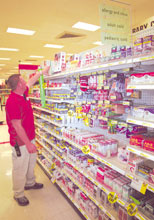Stores monitor OTC sales

Shaun Fanning, team leader of health and beauty at Target, straightens healthcare products. Some people use these items to make meth.
It’s their policy, and they’re sticking to it.
In order to prevent the use of over-the-counter medications in the production of meth, many retail stores in the area have adopted strict sales rules.
“I hope it’s helping with the problem,” said Thomas Bartle, store manager for Walgreen Drug Stores in Joplin. “I hope we’re making it more difficult for them to get the things they need.”
Walgreen’s allows each customer to buy only one box of 96 pills or two boxes of 48 pills of any medicine containing sudaphedrine. The store has had this policy for more than two years. The store also keeps all such drugs locked up behind the registers.
“Since we have such a problem, we have to enforce it a little differently,” he said.
Bartle said the national company policy is a bit more lenient than the Joplin store policy.
“Our sales are down in those products,” he said. “But I would just as soon our sales be down than contribute to something like making meth.”
While Walgreen’s reports a decline in sales, Wal-Mart claims its policy on selling medicines containing sudaphedrine has actually helped the store economically.
“We noticed we weren’t losing a profit because it wasn’t being stolen,” said Charles Stotts, store manager for the Wal-Mart located on 1501 S. Range Line Road. “We didn’t decrease our sales, we just decreased the amount of product we were buying and losing.”
The Wal-Mart policy, a national one, limits customers to buying two boxes of anything containing sudaphedrine. The registers will not scan more than two boxes per customer. Stotts said these rules have been in place for about three years.
“It was a response to a national problem,” he said.
The drugs are also not located on the shelves. Customers must go to the pharmacy and ask an employee to get the medicine for them.
“When we first made the restrictions, people complained,” Stotts said. “When we didn’t give up our policy, they stopped. People that make meth know what our policies are. They aren’t going to push us, and we aren’t going to bend.”
Target has a similar policy, but the store does not lock up medicines containing sudaphedrine like the others. Target restricts customers to buying three boxes per transaction.
“If you try to sell more than three, the system will not allow it,” said Brent Hensley, executive team leader in team relations.
Target’s policy is also a national one and has been in place for about a year and a half, Hensley said.
He said while the rule has prevented some excess sales of sudaphedrine, it is not fool-proof.
“It’s as effective as it can be,” he said. “There’s a lot of that (meth production) that goes on in this area. I hope it would decrease the amount of meth that’s produced. That’s the ultimate goal.”
Managers of the stores said their policies have helped reduce the sale of drugs used to illegally make meth, but they still experience other problems.
Although theft is not much of a problem now, Bartle said Walgreen’s is now experiencing different difficulties. He said some customers try to find a loophole in the policy.
“A group will come in together,” he said. “Each will come to the register individually, or one will wait in the car and come in after the other.”
Stotts said Wal-Mart does not have many problems with the sale of medicines, but it does with other products such as batteries that can be used in making meth.
“If anyone comes in and buys a good many of the ingredients in making meth, we report them to the Joplin Police Department,” he said.
Stotts also said the store’s security measures, such as undercover shoppers, cameras and sensors, prevent theft.
For security reasons, Hensley declined to talk about any problems Target experiences and what it does to prevent them.
Stotts said he hopes policies such as Wal-Mart’s are preventing meth production.
He said the problem continues, however, when people can go to certain gas stations, farm supply stores and hardware stores to buy meth ingredients without restrictions.
“It takes the whole community to stop this,” he said.
Your donation will support the student journalists of Missouri Southern State University. Your contribution will allow us to purchase equipment and cover our annual website hosting costs.















